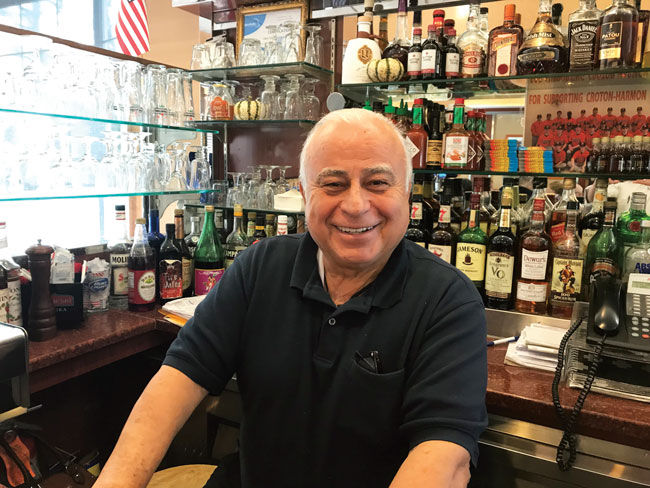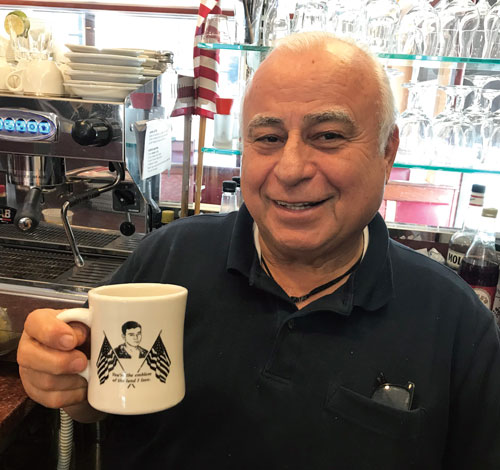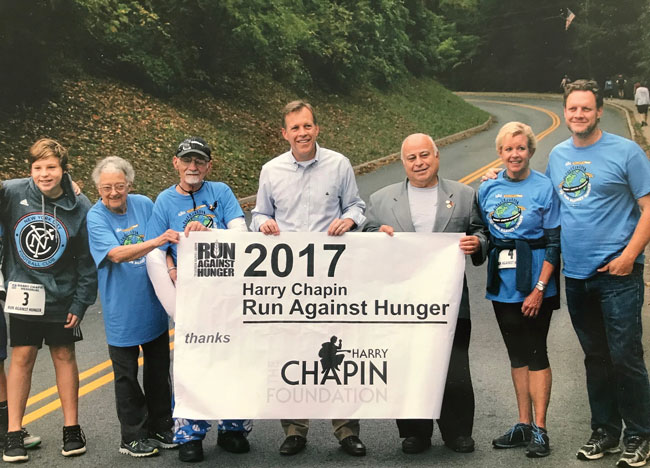Profiles in Success: Pete Tsangarakis Quenches His Appetite for Business and Philanthropy
Posted by estiator at 12 December, at 15 : 30 PM Print

Pete Tsangarakis at his Croton Colonial Diner in Westchester County, NY.
ONE of the most profound memories of Pete Tsangarakis’s early time in his adopted country was his first Christmas here. He was just 19 years old, had no relatives or friends, and had just gotten a job through an employment service that helped Greek illegal immigrants like himself to find work, usually as restaurant workers. He had gotten one of those jobs at the Green Lane Diner in Mount Kisco, New York, a suburb situated off the Saw Mill Parkway in Westchester County. Where the bustle of Manhattan may have offered options for the holidays, this sleepy town had none—at Christmas all of the eateries were closed for two days. As a result, Pete didn’t eat. And so he spent his first Christmas alone and hungry. That first Christmas, he says, formed the person he would become.
That was in 1965. Today Pete is a successful businessman and philanthropist who is committed to a number of social causes, most importantly, helping the hungry—particularly those in his community.
Pete’s story starts on the idyllic island of Kerkyra in the Ionian Sea. At age twelve, Pete left the island to attend school in Athens. Restless, he didn’t stay in school long, but went to work in the sweet shops of Greece’s capital city, as many young boys did in those days. As soon as he was old enough, he put in papers for his maritime permit and, at the age of sixteen, left Greece aboard a ship owned by the legendary Aristotle Onassis. When the ship arrived in New York, he “jumped,” and has been here ever since.
“I met a Greek in New York at the bus terminal on Eighth Avenue,” he recalls. “He brought me to a billiards hall where there were some Greeks. ‘Look at them,’ he told me. ‘They don’t have money to buy lighters for their cigarettes.’ He told me that I had two options: to work hard or to be like them. ‘America has great demand for people that want to work,’ he told me. ‘But you have to work very hard.’ I knew then that this was going to be my new home.”
Within just five years Pete owned his first restaurant. Purchased from the Kyriazis family, the small diner in Croton-on-Hudson provided an opportunity for Pete to develop as an entrepreneur and as a philanthropist. For his first Christmas as a restaurant owner he sent food to shut-ins and needy members of the community, a tradition that continues to this day. Every Thanksgiving and Christmas, he heads to the diner and personally prepares full-course meals that are delivered to people who may not otherwise get them. This philanthropic act eventually evolved into an organized effort that, today, is supported by many area businesses. The Croton Caring Committee has eleven board members, with Pete as president, and serves over 100 meals every week to those in need. In the meantime, twice each year the diner hosts a sit-down dinner for over 100 seniors and families in need.

The coffee mug at the Croton Colonial Diner depicts Pete Tsangarakis as a 16-year-old that came to the United States as an illegal alien and realized the American Dream. The two American flags are a symbol of the country he “loves very, very much” along with the transcription: “You’re the emblem of the land I love.”
In 1976, with America’s bicentennial year in full swing, Pete tore down his small diner and erected a new building. “I gave it the name Croton Colonial Diner because I wanted to honor America,” he says. With the new building came more success, and greater engagement with the community. “James Kyriazis, whose family owned the diner when I bought it, asked me to join the Masons,” he says. From there his philanthropic activity blossomed.
At the same time, Pete saw opportunities to continue to grow his entrepreneurial reach. In 1980 he purchased diners in Pleasantville and Yorktown and, a few years later, a restaurant/ catering venue in Cortland. With four businesses operating successfully, he turned his focus to philanthropic endeavors, and in recognition for those efforts was named Man of the Year by the Lion’s Club in 1986.
And again, with that first Christmas in mind, Pete became involved with one of his community’s most important events. The Harry Chapin Run Against Hunger was established to honor folk singer/activist Harry Chapin, who successfully lobbied Congress and then-President Jimmy Carter to create the Presidential Commission on World Hunger and helped found the organizations WhyHunger and Long Island Cares (one of the country’s first regional food banks). The local event was established to provide support for local residents in need, a theme that runs constant throughout Pete’s adult life. In 1988 the Run was nearly out of funds and was going to cease operating when Pete stepped in with a large donation to keep it alive. Today it continues to operate and raise awareness and money for the hungry. And aside from supporting local food banks, it has provided overseas relief to the hungry in far-reaching places that include Mozambique and Haiti.

Pete Tsangarakis (third from the right) with the family of the late folk singer Harry Chapin and local beneficiaries at a Run Against Hunger event that benefits local food banks.
In the late ’90s Pete sold all of his businesses except for his beloved Croton Colonial Diner, where he continues to work “24/7 but trying to not work at all,” as he jokes. Still, he finds time to continue his philanthropic work, residing as President of the Pan Gregorian of Upper New York’s charitable organization, which has given hundreds of thousands of dollars to community organizations, particularly Greek Orthodox schools, churches and St. Basil’s Academy.
Another passion that occupies Pete’s time and energy is the business side of the Pan Gregorian of Upper New York. He has been a member since that group’s earliest years and is a past president. He currently serves on its Board of Directors. “The Pan Gregorian has brought respect to the independent business owners and the local restaurant industry,” he says, pointing to the power of speaking with one voice when dealing with manufacturers and suppliers that service the industry. With over 600 members, he is proud of the benefits the organization has yielded for its members, while acknowledging that there are still opportunities to grow those benefits.
“It’s difficult to get all of the members on the same page” with regard to suppliers and products, he says, indicating that the individual members often put existing relationships ahead of a unified front, even if it is against their self-interests. “The power is in unity,” he says. “We need to improve our communication and our connection to one another to achieve this.”
The greatest opportunity, he insists, is in the power of the Pan Gregorian of America, an organization that was created about a decade ago to unite the existing Pan Gregorian organizations at the national level. “This is a sleeping giant,” he comments, indicating that true power can be wielded with food manufacturers once the collectives effectively leverage their consolidated full memberships.
At age 70, Pete is as full of energy as anyone half his age. And while his stomach is no longer hungry, his appetite for advancing the cause of his fellow Pan Gregorians and for helping his neighbors in need has never been greater.
D.K.






















